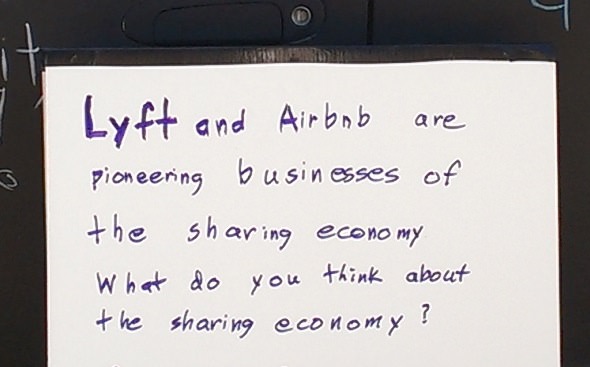The Crap Jobs of the ‘On-Demand’ Economy
Companies like the car services Uber and Lyft, which are valued together at $30 billion, are successful only because the economic recovery has created a desperate workforce willing to work for a pittance, Bloomberg columnist Katie Benner writes.
Companies like the car services Uber and Lyft, which are valued together at $30 billion, are successful only because the economic recovery has created a desperate workforce willing to work for a pittance, Bloomberg columnist Katie Benner writes.
Benner calls the “on-demand” economy “a hassle free way to find workers when you need them for a pretty low price”:
Startups that connect service workers and customers have raised lots of venture capital based on the idea that low prices will democratize and popularize services that were once reserved for the rich. The viability of these enterprises is tied to scale. Once they are popular and ubiquitous enough, the argument goes, they’ll transform massive swaths of the service economy including transportation, retail and the workforce itself.
To become ubiquitous, these companies need lots and lots of cheap contract laborers to serve customers who want them to be available at the push of a smartphone button. But there’s a big vulnerability in all of these business models: They wouldn’t work if they had to offer full-time jobs with substantial benefits, and the reliance on contract workers to sustain this burgeoning market has become controversial. Kevin Roose recently noted in New York magazine that an emerging “1099 economy” explains how it’s “possible for a cash-flush tech start-up to have homeless workers.”
Benner identifies workers living on the edge as the cause of the emerging sector’s success:
Boosters say that the on-demand economy is an innovative, hyperefficient way to deploy the workforce, while detractors say it’s more evidence that the tech industry is missing an empathy chip. Wherever you land in that analysis, there’s no question that the on-demand economy is an offshoot and a beneficiary of the fact that many U.S. workers are struggling. In that regard, on-demand companies are not Silicon Valley inventions that are changing the nation. Rather, on-demand has thrived, in part, because the nation has dropped a bedraggled and optionless workforce in its lap — and on-demand’s success depends in part on the idea that our nation won’t change.
Read more here.
— Posted by Alexander Reed Kelly.
Your support matters…Independent journalism is under threat and overshadowed by heavily funded mainstream media.
You can help level the playing field. Become a member.
Your tax-deductible contribution keeps us digging beneath the headlines to give you thought-provoking, investigative reporting and analysis that unearths what's really happening- without compromise.
Give today to support our courageous, independent journalists.






You need to be a supporter to comment.
There are currently no responses to this article.
Be the first to respond.